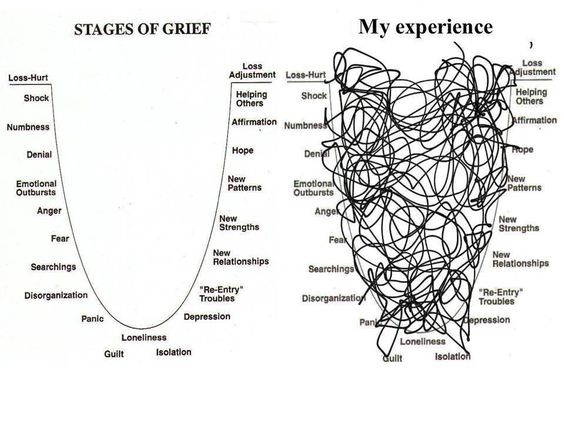Talking to your kids about Divorce
Divorce can be very disorienting to children. They are confused, sad, and angry. Often children of divorce feel powerless as so much of their life changes. With kids of divorce, their life changes more than the parents because they have to make frequent transitions between two homes. Children have a lot to grieve over their parent’s divorce. Even many years after the divorce, adult children of divorce still worry about managing their divorced parents over the holidays. Which parent gets to have their adult children and grandchildren at Christmas? There is no enforceable divorce decree, so how do these adult children make both parents happy, while still caring for themselves? Divorce impacts children for their lifetime.
Here are 7 ways to help your kids grieve and move forward:
1) Grief is not a linear journey it is messy.

I love the picture below because it speaks to the messiness of grief. Therefore, as you are dealing with your messy grief, your kids have theirs as well. It is important to be patient with you and your kids, but knowledge is power. Help them prepare for this journey by explaining what they may experience. Be patient with yourself and them. Divorce always seems to add another layer of grief or change, when new circumstances arise.
2) Listen to your kids without judgment or defensiveness. Be curious.
Oftentimes just talking with someone will often relieve people’s anxiety, especially for kids. Kids can often have physical symptoms like stomachaches and headaches as a result of stress. Parents, you cannot fix your divorce or your kid’s stress, but you can actively listen to how they feel. So saying things like, “Hmm I wonder why you’re so angry today?” or “I’m so sorry, I know this hurts. Can I sit with you for a little while? We don’t have to talk. I just don’t want you to be alone right now.” If your parents are divorced, you can relate to their feelings and then tell them stories about how you felt as a divorced kid. If not, then don’t say you understand, because you don’t know what it feels like to give up a parent every other week or weekend. So empathize. Brene Brown has a great video on the difference between sympathy and empathy.
3) Find time to play.
Grief is exhausting, but kids still need to play and so do you! Playing can be watching a movie together, coloring, going to the park, or having friends over for take-out. It does not need to be extravagant. As a parent going through a divorce, you are walking through your own grief and your kids are watching. Having time to laugh and play may feel like too much, but it will help reassure the kids that all of you are going to be OK. A caution, though, to those parents that always want to play, it is important that you do not become a “Disneyland parent”. Providing stability with discipline and allowing some downtime for them to grieve is helpful.
4) Remind kids that everyone has a journey and no one gets through life pain-free.
As a Christian, I believe that we don’t get through this life without suffering or pain. I believe as parents today we often have an uphill battle convincing our kids of that, because all they see on social media is their friends having fun, great, fulfilling lives. We know that’s not the truth, but they do not. So, help them pull back a bit and see the bigger picture in that everyone has pain. Some kids are living in alcoholic or abusive homes. Some families are struggling with health or financial issues. Divorce is part of their story, so how can they learn from it and eventually use it to help others? Also, this is an opportunity for them to learn coping skills. Model good coping skills for them, so they know how to cope with difficulties.
5) Help them find words for their feelings.
I have a feelings sheet I use often in my office to help my clients come up with what they are feeling. Often, we all use words like sad, mad, scared, and happy. Help them expand their feeling vocabulary to become more accurate with their emotional vocabulary. Also, let kids be honest with you without you becoming defensive or blaming your co-parent. Often kids of divorce are afraid of hurting one parent’s feelings, so they get good at saying what they think others want to hear. You can also acknowledge their feelings and say, “Yeah I could see how you feel that way”. You can’t fix their feelings but don’t minimize them either. What they are feeling is real and when you acknowledge them, you empower them. Finally, reassure them. Just like you need to be reassured that you will make it, kids do too! You can do this with physical closeness like hugs or just sitting close to them. Don’t forget to reassure them that they will be taken care of and loved forever. Divorce won’t change that.
6) Tell the truth without blame.
Kids want to know the truth and will eventually find out, whether they overhear a conversation or find out some other way. Obviously, if they are little you would not want to tell them about infidelity. They cannot process that. However, when they are older it is important for them to know some of the truth. With that said, even with infidelity, you need to avoid the blame game. The marriage was not working for many reasons and both of you played a part. Also, you do not need to share every detail. What kids really want are two happy parents. Sharing every detail of the downfall of your marriage will not be helpful to them. Find a trusted friend that you can vent to.
7) Be patient.
Just like you, kids are fine one moment and upset the next. They may solidly understand the reasons for divorce one day, and be confused and upset the next day. Additionally, grief is work. Many grief experts have created new stages for grief and now call them tasks because grief is hard work. Be patient with them and yourself as your family all try to move forward.
You may also find our blog “Tips on how to talk to your kids about divorce” helpful.
Another blog is “7 ways to help kids grieve your divorce”
If you need help learning how to help your kids grieve your divorce, email us at hello@sparrowcounsel.com or call us at 205-538-3978.

Sara Dungan, the owner of Sparrow Counseling, is an M.Ed, LMFT, LPC, NCC, Certified Parenting Coordinator, Divorce and Family Mediator (Domestic Violence Trained) and has a private practice called Sparrow Counseling in Birmingham, AL. She specializes in Parenting Coordination, Co-Parenting Counseling, and Divorce and Family Mediation. Her passion is helping parents learn how to become successful coparents, so their children can thrive after their divorce. Contact Sparrow Counseling if you are interested in getting help at hello@sparrowcounsel.com.
